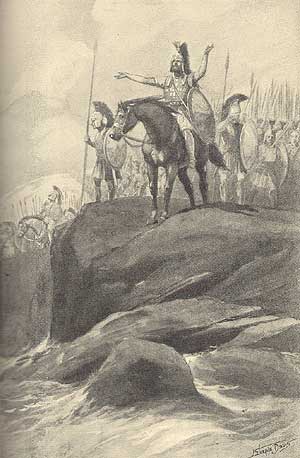Gunnar Peterson interviews Thomas P.M. Barnett
Friday, July 31st, 2009Cybersecurity expert and blogfriend Gunnar Peterson of 1 Raindrop snagged a multi-part interview with grand strategist and blogfriend Dr. Thomas P.M. Barnett, author of Great Powers. Peterson is doing a superb job at elicitation with his questions:
GP: ….It seems that the emerging middle class is the main factor that separates the developing countries’ past and future, they always had some very rich people and many very poor people, but now depending on how you measure it,
India’s middle class is 200 million people. What trends should we watch as the global middle class emerges? What milestones will mark key events along the progression?
TB: The one of greatest interest is when per capita income gets in the range of $5,000 per year. Somewhere between $5,000 and $10,000 is where you see previously authoritarian, single-party-dominated states move into the process of increasingly pluralism, typically started when a reformist faction breaks off from, and begins to challenge, the dominant party.Obviously, India is already blessed in that regard, so China is the one to watch there. Until China reaches such a level of development, all talk about authoritarian capitalism being superior to democratic capitalism is historically premature. Authoritarian regimes do well with extensive growth (simply adding in more resources) but then tap out when it comes to shifting into innovation-based, intensive growth….
Tom Barnett Interview Part 2 »
TB:….At initial glance, China’s route has higher risks concerning its political system (all those unruly and increasingly assertive urban laborers can go all Marxist on Beijing’s allegedly “communist” ruling party), but India has higher risks
concerning its economic trajectory (you point about scaling out badly). It’s just easier to imagine-for me at least-China having to change politically than India somehow avoiding industrialization and the social tumult/reformatting it will cause the country’s rural life. China’s got a lot of that already under its belt (although its rural impoverished population remains vast, there are plenty of opportunities for village employment or migration to the cities), and its government seems willing to do whatever it takes to encourage and accommodate the migration from rural areas to cities. But India moving far more tepidly in this direction, the result being that, what rural-to-urban migration does occur, often results in rather scary urbanization scenarios (more slumdog than millionaire).
GP: Many security writers and thinkers are obsessed with threats, they throw a dart a connected systems, extrapolate worse case scenario and everything goes “boom!”; your work is different, it accounts for system perturbation from threats but has more focus on the system resiliency to deal with events over the long haul. I find this system thinking lacking in many of your peers, and have never understood how worst case threat extrapolation can automatically lead to a parasite that takes over its host. Can you explain why its different to think of security in terms of resiliency rather than simply threats? What insights fall out of this distinction?
TB: Worst-case thinking obviously has its uses in the national security realm. I just think we got into very odd, extreme tendencies during the Cold War, when the threat of nuclear conflict distorted our thinking unduly. We’re just beginning to see thinkers and analysts and strategists emerge from a post-Cold War educational environment, like my nephew Brendan who’s studying Russian and International Relations (as I once did) at my alma mater, Wisconsin. The problem is, the field of international relations, as Brendan will attest, is still obsessed with game theory and all sorts of artificial schools and still tends to be way too insular (economics still needs to embraced far more, not in some antiseptic academic sense but more in a keen understanding of how international business works). But the key thing is, Brendan and others of his generation won’t be held to the extreme fears that my generation was, despite the constant hyping of the threat of nuclear proliferation, so they’re forced to cast their nets wider and that’s a good thing.
Tom is pointing to the “higher level of play” that leaders need to operate at if their foreign policies and national security strategies are to be based upon sound assumptions ( I would also throw in accounting for greater systemic instability or probability of Black Swan system perturbations)
An old saw is that amateurs study tactics while professionals study logistics. Strategists study geoeconomics because the structural economic shifts within and between countries and regions are not only predictive of where strife is likely to occur or never materialize but they set the framework or parameters on how effectively states are able to exercise “hard” forms of power. Interdependence wrought by globalization multiplies your leverage but it also constrains it’s uses.
For a great power, it’s a very short step in statecraft these days between “zen master” or as a “pitiful, helpless, giant”.

 many “
many “



